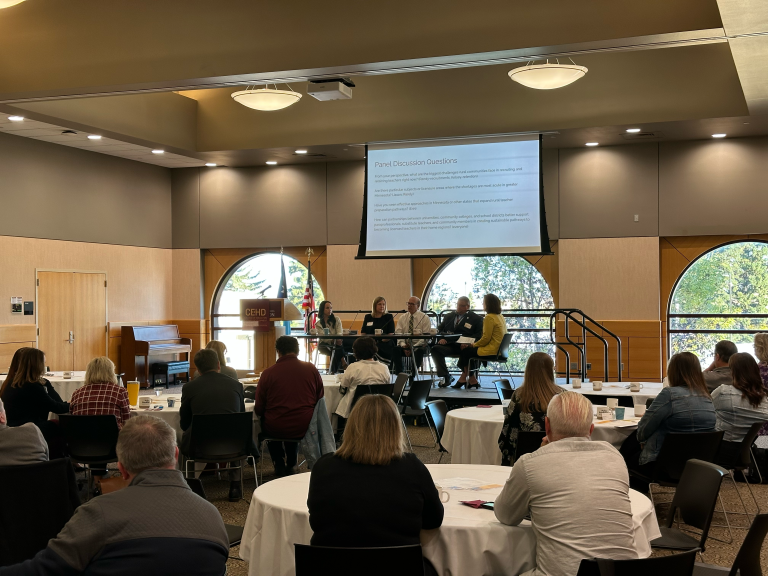News
CEHD hosts Crookston Policy Breakfast on teacher shortages and preparation pathways

On October 13, CEHD hosted approximately 50 educational leaders and policy makers for a Policy Breakfast at Bede Ballroom on the campus of the University of Minnesota Crookston, focused on teacher shortages and preparation pathways in Minnesota.
The program started with a welcome from Rosemary Johnsen, Vice Chancellor for Academic and Student Affairs for the University of Minnesota Crookston, and Michael Rodriguez, Dean of the College of Education and Human Development at the University of Minnesota Twin Cities.
Cari Maguire, executive director of the Office of Teacher Education at the University of Minnesota Twin Cities, began the discussion by highlighting how teacher shortages are a national problem. As of 2025, an estimated 411,500 teaching positions were either unfilled or filled by teachers not fully certified; about 1 in 8 teaching roles nationwide (Learning Policy Institute). Maguire presented some possible reasons for fewer people entering the teaching profession, which included lengthy and/or costly certification/licensure pathways and insufficient incentives to pursue teacher training programs.
Maguire followed this by sharing some statewide initiatives to address the shortage, which included: Grow Your Own, legislative grants, alternative prep pathways, loan repayment incentives, investments in teacher recruitment and marketing, teacher mentoring, and residencies and apprenticeships. An example of a University of Minnesota system-wide solution is the NXT GEN Teach Apprenticeship.
- Shari Daniels, teacher education program director and associate professor of literacy at the University of Minnesota Crookston, moderated a panel of experts, including:
- Randy Bruer, interim superintendent at Crookston Public Schools
- Erin Ðoàn, director of educator preparation and pathways at Minnesota’s Professional Educator Licensing and Standards Board (PELSB)
- Kelsey Johnson, elementary principal at Red Lake County Central Schools
- Jason Stanoch, principal at Bemidji High School
Bottom L to R: Randy Bruer, Jason Stanoch
The panel discussion talked about several pressing issues related to the recruitment and retention of teachers in rural communities. From the panelists' perspectives, some of the biggest challenges include the difficulty in attracting new teachers to rural areas and the ongoing struggle to retain them once they are hired, with low salary and the public perception of the teaching profession identified as contributing factors. The conversation also addressed the specific subject areas where teacher shortages are most severe in greater Minnesota. They also shared insights into effective approaches being used in Minnesota and other states to expand rural teacher preparation pathways. Finally, the panel explored how partnerships among universities, community colleges, and school districts can play a crucial role in supporting paraprofessionals, substitute teachers, and other community members in developing sustainable, localized pathways to becoming licensed teachers within their own regions.